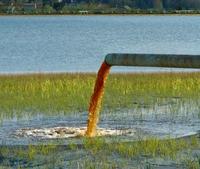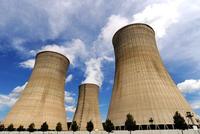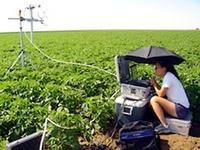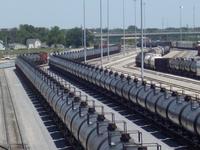-
Researchers develop better methods to detect E. coli
Researchers have developed a method to detect E. coli before it can potentially contaminate the food supply. The newly developed test is a molecular assay, or polymerase chain reaction, that detects bacteria based on genetic sequences, which are the bacteria’s “fingerprints.” The new approach to E. coli detection would benefit the beef industry by preventing costly recalls, and it would benefit consumers by ensuring the safety of the beef supply.
-
-
ISIS insurgents take over Iraq’s largest refinery, continue advance toward Baghdad
Earlier this morning (Wednesday) ISIS Islamic militants took over Iraq’s biggest oil refinery, located near the town of Baiji, 130 miles north of Baghdad. The fall of the refinery is a major blow to the already-reeling government of Nouri al-Maliki. The refinery provides about 40 percent of Iraq’s refined oil needs, and if the supplies dry up, the Iraqi economy would be paralyzed within a few days, and Iraqi citizens would be without power or gas for their cars. As was the case since the ISIS campaign began late last week, the Iraqi military and security forces put up only a token resistance, with most of their units melting away and leaving their arms and equipment behind without even engaging the militants. Iraq is the second largest oil producer in OPEC.
-
-
Security flaw: Researchers find thousands of secret keys in Android apps
Researchers have discovered a crucial security problem in Google Play, the official Android app store where millions of users of Android, the most popular mobile platform, get their apps. “Google Play has more than one million apps and over 50 billion app downloads, but no one reviews what gets put into Google Play — anyone can get a $25 account and upload whatever they want. Very little is known about what’s there at an aggregate level,” says one of the researchers.
-
-
Texas limits release of information about toxic chemicals storage in the state
Shortly after the 2013 chemical explosion at a fertilizer plant in West, Texas, the Texas Department of State Health Services(DSHS) releasedto several media outlets its list of businesses across the state that store or handle large supplies of chemicals, including ammonium nitrate, the chemical which ignited the explosion. More recently, the department has been working to limit the release of its database of chemical inventories from the public.
-
-
Chemical pollution of European waters is worse than anticipated

Until now environmental authorities and parts of the scientific community have considered toxic chemicals to be rather a local problem affecting only a few bodies of water. A new study, however, reveals for the first time on a large scale the ecological risks emanating from chemical toxicants for several thousands of European aquatic systems. Chemical toxicity represents an ecological threat to almost half of all European bodies of water, and in approximately 15 percent of cases, the biota in freshwater systems may even be subject to acute mortality.
-
-
New approach to balancing security and privacy
Online identification and authentication keeps transactions secure on the Internet, but this also has implications for your privacy. Disclosing more personal information than needed online when, say, you log in to your bank Web site may simplify the bank’s security at the cost of your privacy. Now, thanks to research by the EU-funded project Attribute-based Credentials for Trust, or ABC4Trust, there is a new approach that keeps systems secure and protects your identity.
-
-
Skilled immigrants to be granted “express entry” to Canada to meet labor market needs
Canada’s immigration minister Chris Alexander has announced a new immigration system, set to launch in 2015, allowing qualified skilled immigrants to enter the country as permanent residents as a way to fill open jobs where there are no available Canadian workers. The immigration ministry has promised to process applications within six months or less.
-
-
Economic relationships, not terrorism fears, drive visa decisions: study
Despite heightened focus on preventing global terrorism since the 9/11 attacks in 2001, researchers have found that the economic relationship between two countries is the most significant factor in determining the acceptance or rejection rate of visas. “Surprisingly what I find is the global reputation a state garners as a prominent origin of terrorism has a very minute impact when you take into account trade interdependence,” the study’s author says.
-
-
Carbon-cutting regulations may boost prospects of nuclear power plants

In a report issued last Thursday, Standard & Poor’s Ratings Services (S&P) predicted that new nuclear plant construction could benefit from the Environmental Protection Agency’s (EPA) recent carbon-cutting guidelines for current natural gas power plants.
-
-
Debate continues over controversial lawsuit-killing Louisiana oil bill
Governor Bobby Jindal (R-Louisiana) is facing a difficult decision over whether or not to veto a measure which would kill a contentious lawsuit filed by the Southeast Louisiana Flood Protection Authority-East (SLFPA-E) against ninety-seven different oil and gas companies regarding long-term environmental damage claims, including those of the 2010 Deepwater Horizon explosion.
-
-
Reducing use of nitrogen-based fertilizers helps combat climate change

Nitrogen-based fertilizers spur greenhouse gas emissions by stimulating microbes in the soil to produce more nitrous oxide. Nitrous oxide is the third most important greenhouse gas, behind only carbon dioxide and methane, and also destroys stratospheric ozone. Agriculture accounts for around 80 percent of human-caused nitrous oxide emissions worldwide, which have increased substantially in recent years, primarily due to increased nitrogen fertilizer use. Scientists help farmers around the globe apply more-precise amounts of nitrogen-based fertilizer to help combat climate change.
-
-
Recession-related cost measures blamed for U.S. infrastructure lagging development
In an alarming fall, the United States is currently ranked 19th in the quality of its infrastructure, according to the World Economic Forum’s Global Competitiveness Report. Additionally, the American Society for Civil Engineers (ASCE) has given the country a D+ on its annual Infrastructure Report Card, arguing that $3.6 trillion is needed by 2020 for maintenance and upgrades.
-
-
Feds, rail operators, Washington State embroiled in crude oil shipment disclosure dispute

Last month the U.S. Department of Transportation(DOT) ordered rail carriers with trains carrying crude oil to notify state officials in the states through which the trains pass about the volume, schedule, and routes of these trains. The amount of crude oil transported by trains has grown dramatically – from 6,000 carloads in 2005 to more than 400,000 carloads in 2013. The increase in the volume of crude oil shipping has been accompanied by a sharp rise in the number of accidents and derailments. DOT’s order was meant to allow states’ first responders to be prepared, but the railways treat shipping information as “security sensitive” and refuse to share it with states’ officials unless the information is distributed to emergency response groups for planning purposes only. Washington State says that state laws require that such information be made public.
-
-
Security guard industry lacks standards, training

Despite playing a more important role in the wake of 9/11, the security guard industry remains plagued by inadequate training and standards in many states, new study of the $7 billion-a-year industry finds. Formal training of the nation’s one million-plus private security officers is widely neglected, a surprising finding when contrasted with other private occupations such as paramedics, childcare workers, and even cosmetologists.
-
-
Adm. Michael Rogers: Businesses must “own” cybersecurity threats

Cybersecurity threats are a vital issue for the nation, and like the Defense Department, businesses must own the problem to successfully carry out their missions, DOD’s top cybersecurity expert told a forum of businesspeople.
-
More headlines
The long view
Factories First: Winning the Drone War Before It Starts
Wars are won by factories before they are won on the battlefield,Martin C. Feldmann writes, noting that the United States lacks the manufacturing depth for the coming drone age. Rectifying this situation “will take far more than procurement tweaks,” Feldmann writes. “It demands a national-level, wartime-scale industrial mobilization.”
Trump Is Fast-Tracking New Coal Mines — Even When They Don’t Make Economic Sense
In Appalachian Tennessee, mines shut down and couldn’t pay their debts. Now a new one is opening under the guise of an “energy emergency.”
Smaller Nuclear Reactors Spark Renewed Interest in a Once-Shunned Energy Source
In the past two years, half the states have taken action to promote nuclear power, from creating nuclear task forces to integrating nuclear into long-term energy plans.
